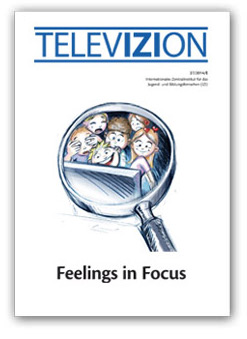|
 >> Overview publications >> Overview publications
EDITORIAL
Emotions are deeply human and omnipresent. Perceiving them in oneself and in others, understanding them, and purposefully dealing with them constitutes emotional intelligence – one of the surest predictors of success and of a satisfying life. Supporting children and adolescents in their development means, in particular, strengthening them in their emotional competence and helping them to appreciate emotions as a resource (Glasenapp, Doubrawa). The repertoire of emotions that children and adolescents experience is similar around the world. How often they experience emotions, whether they show these to others, and to what extent they are accepted by their environment, however, differs clearly in some cases (Götz/Schwarz).
Television for children and adolescents can make a contribution to emotional intelligence, for example, by portraying a constructive approach to anger (Fuhs/Peklo) and by avoiding unrealisable ideals of love and relationship (Reznik). Television has long been suspected of causing aggression, yet a thorough review of the research literature shows that a simple stimulus-reaction pattern does not exist (vom Orde). Within the text television suggests certain emotions, it allows one to sympathise by connecting with typical experiences (Mikos), and it makes viewers laugh when it distorts the familiar and thus narrates in a comic manner (Prommer). Emotional emphases are suggested by means of staging and especially of music, relationships that first become clear in their full potency when sound design and musical setting vary (Götz). Reception studies strikingly indicate how quickly children experience fear when the characters are repelling, when the scene becomes threatening, and when injuries are depicted. Television can become an experience full of fear, one that viewers carry with them for decades (Unterstell/Müller).
Three quarters of children cope with what they have seen on television in their dreams. This can lead to traumatic television experiences when children see things that exceed what they imagined until now of how people can be and what they can do to each other, in a manner that they cannot come to terms with (Holler/Müller). The pleasure of excitement, the “thrill”, can only be enjoyed when viewers can conceive of themselves as capable of acting (Unterstell/Müller.
Maya Götz
Head of the International Central Institute for Youth and Educational Television
RESEARCH
Maya Götz/Judith Schwarz
Having and showing emotions
For an international IZI study 5,190 children
and preteens between 6 and 15 in
17 countries were surveyed whether and
how they have and show emotions.
Lothar Mikos
When tears are dropping...
Not all viewers are emotionally stirred
by the same film scenes. As this article
explains, whether one is moved or not
depends on the viewers’ individual
biographical structures of experience
that interact with the way a programme
is made.
Shiri Reznik
“It must be love”
An IZI study with 51 children and adolescents in Germany inquired how children experience stereoscopic 3D technology, and what expectations they bring to films with this technology.
Elizabeth Prommer
Stirring up a good comedy
Can we create a scientific recipe for good
children’s comedy? This text presents
such a formula as a synthesis of academic
analyses of humour and practical advice
from scriptwriters.
Maya Götz/Maria Berg
“So, what’s so funny about that?”
Sabrina Unterstell/Amelie Müller
“I was very creeped out and my heart
was racing”
In an international study, 631 students
from 8 countries recalled childhood TV
experiences that had scared them.
Andrea Holler/Amelie Müller
“I’m running very fast but they can still
catch me”
Sabrina Unterstell/Amelie Müller
“I loved it! It was so creepy but not in a
way that made me scared”
Burkhard Fuhs/Maria Peklo
“Anger is sometimes good,
sometimes bad”
Maya Götz
Because they feel what they hear
PROGRAMME RESEARCH
Christine Bulla/Sonja Esmailzadeh/Caroline
Mendel
Danger, excitement, epic love and being
special
Maya Götz
Death, grief and suicide in children’s
television
RESEARCH DOCUMENTATION
Heike vom Orde
Children, television and emotions
Heike vom Orde
Does television cause aggressive
behaviour?
Research Bibliography Television, Children, and Violence
INFORMATION
Birgit Kinateder
Clear and brief: emotions
INTERVIEW
Jan Glasenapp
Emotions as resources
Erhard Doubrawa
“Noticing more makes us act more
decisively”
Alfredo Marrón Santander
Once I dreamt
Kazuyo Fukuda
The Kamaishi Miracle
Gunter Kreutz
Music is inner movement
|




